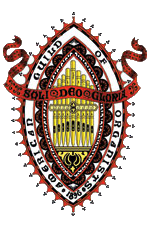Learn how to play the organ with a supportive community of professional organists
About The Baltimore AGO
The American Guild of Organists (AGO) is a national organization founded in 1896 that serves the organ and choral community with 275 chapters and 12,000 members. Its mission is to promote organ music, improve members’ proficiency through education, and exchange vast knowledge about organ building, its music, and use.
The Baltimore Chapter of the American Guild of Organists (BAGO) is a peer-led organization that cultivates musical excellence, professional development, and continuing education through performances, master classes, networking events, and mentorship. Members gain benefits from both the national organization and local chapter. Organists aged 29 and under can register as young organist members.
Understanding the Anatomy of Pipe Organs
The pipe organ has a keyboard like the piano called a manual, as well as a separate keyboard for the feet to play called a pedal. Organs are most often found in churches but are also found in concert halls throughout the world. Pipe organs consist of pipes, one or more keyboards, a wind system to deliver air to the pipes, and a wide variety of stops. With different stops, the organ can imitate the sounds of various instruments such as oboes, flutes, trumpets, and violins. Some stops create sounds from nature. Other stops may include chimes or bells. There is a wide variety of stops and each organ is different. The possibilities are almost limitless!
What’s So Special About the Organ? Why Take Lessons?
Because pipe organs are found everywhere in the world and each organ is unique, organists often travel far to play special, unique, or famous instruments. Each organ is like a new book – it has its own fascinating story. The organ has been referred to as the “king of instruments.” It can produce a massive and impressive sound… all created by a single performer! The large variety of sounds inspires creativity, and your imagination is the only limit.
The organ itself is often a work of art and fine craftsmanship, and the hall that contains an organ is a stunning, beautiful sight. If you take lessons regularly or go to a place of worship that houses an organ, you will learn how to successfully lead a congregation in singing and how to make music which inspires people’s hearts and minds.
If I Already Take Piano Lessons, Why Do I Need an Organ Teacher?
You can certainly apply your knowledge of how to play the piano to playing the organ. However, the touch of an organ is entirely different from the piano and requires special training. Learning how to produce sound and weave together artistry and technique takes delicate attention and an experienced mentor. For instance, playing efficiently with both your hands and feet is a skill that is unique to the organ. Teachers from the Baltimore Chapter of the American Guild of Organists will help you develop the ability to weave together the technique and artistry of organ playing.
You’re Invited to Apply and Get Started
Anyone who is interested in learning to play the organ is invited to apply. Please note that basic keyboard proficiency is required. If you are awarded a scholarship, the committee chair will work with you to help coordinate lessons with a suitable teacher.
Want More Information or a Paper Application?
You can download our Scholarship Brochure or Paper Application.


